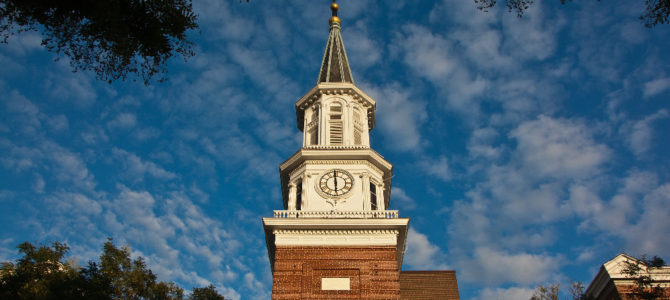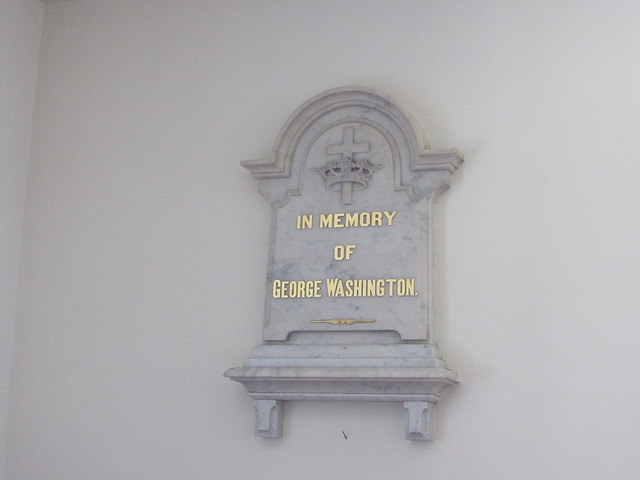
People make slippery slope arguments for a reason. A movement’s proponents often play at incremental change, but there is a natural inclination to take any argument to its logical conclusion. Any drive for change—even one that begins with good intent—has a tendency to spin out of control and become the most extreme version of itself.
We see this now with the new iconoclasm. When, a few months ago, voices on the Left began to call for destroying Confederate statues across the South, voices for moderation cautioned that the mob’s demands for destruction, once unleashed, are difficult to contain.
Ideas are like a maelstrom, spinning and gathering speed. Radicalism exerts a kind of centrifugal force, pushing ideas ever farther to the outer bounds. The calm center is left behind for the buffeting chaos of the outer winds.
A Community Is Defined By Its History
We see this deepening extremism now as Christ Church, Alexandria, the Episcopal church that once numbered George Washington and Robert E. Lee among its parishioners, plans to obliterate the memory of those men from its sanctuary. For a church that values its past, as most old churches do, it shows a shocking disconnection from history. It is another step down that slippery slope of obliterating anything with which we disagree, of hiding away all that makes us remember unpleasantness or pain. It is burying the past instead of learning from it.

Christ Church’s parish was established in 1765 and the building completed in 1773. Before he was a great general or famous statesman, Washington was a member of its vestry, the governing body of an Episcopal parish. Part of the reason people continue to worship in an old structure, even when it is difficult and expensive to maintain, is that they want to feel a connection to the past. It does not make the congregation any holier to know that the father of our country worshipped in the same pews as they do. It adds nothing to their relationships with the Almighty. But it does mean that they are a part of a community.
Community doesn’t just mean a place. It also means being a part of the flow of time there. When a congregant at Christ Church kneels at the altar rail, he receives the Eucharist in the same place as thousands of men and women who came before him. Some were great historical personages, others destined to be forgotten. Some were decent and good, others wicked and petty; most fall somewhere in-between. But all played a role in making the place what it is today and what it will be tomorrow.
Twenty-first-century America often has the feeling of rootlessness. We move around a lot. We join things less than we used to. We are busy, and not apt to notice our neighbors or our neighborhoods. We plant our heads in our phones and computers to keep up with the latest news, and in so doing lose sight of everything that led us here.
Historic places bind us to the past, and historic churches do so more than most. It is one thing to visit a museum, see what there is to see, and leave. Maybe we think about it again, maybe we don’t. But to be a member of an historic parish is to live that history every Sunday. To sit where Washington sat is to keep his memory alive. Doing the same thing he did makes us understand him a little better and makes our history more real, more present in our lives. Removing, piece by piece, those remnants of the past will ultimately reduce the church building to irrelevance and banish the deeds of our forebears, whether they be good deeds or bad, to the realm of irrelevance.
The Value of Tradition
The Episcopal Church famously accepts three sources of authority: scripture, tradition, and reason. That tradition should be mentioned so highly shows that the denomination values its past and honors the contributions of those who came before. Christ Church’s own website claims to “welcome history buffs, travelers, and seekers of information about a church where George Washington worshipped.” They know their history is an asset that draws people in and distinguishes their church from thousands of newer churches. As a parish and sect, they know that history matters to people in ways that are often hard to describe but are nonetheless real and heartfelt.
There is a humility in that. Accepting the importance of tradition recognizes that we do not have all the answers. The men and women who came before us struggled, as we do, with questions of theology, history, and ethics. Our post-colonial forebears wrestled with conundrums like this, of what to do with reminders of a past that they were, in part, casting aside.
Christ Church sits on Washington Street in Alexandria, between King Street and Queen Street. That alone shows the respect for the past our Founding Fathers had even as they were remaking this country’s government from top to bottom. When communists overthrew the tsar in 1917, they killed the royal family and obliterated every mention of them, changing the names of cities, towns, streets, ships, and everything else they could touch. Their destruction of the past was a foretoken of their willful ignorance of humanity itself. Their arrogance was such that they wanted to remake the world and all mankind, and they were destined to fail.
Washington and his generation of Founders were wiser. Half the counties in Virginia were named after royalty when we threw off England’s yoke, but the victorious patriots did not purge the land of those memories. They knew, even as they rejected Britain’s rule, that our past and theirs were intertwined. Having a King Street within hailing distance of the rising republic’s capital is not a contradiction, but only a recognition that the past is complicated and a part of us. It remains with us, sometimes despite our efforts. The past informs us. It persists.
Lee’s memory is more complicated, but is no less a part of Christ Church’s history. As the vestry explained in a recent letter, “Lee was a longtime parishioner, whose family had a significant presence in our church. From ‘Light-Horse Harry’ Lee’s membership in our parish at the time he memorialized George Washington as ‘first in war, first in peace, and first in the hearts of his countrymen,’ to Mary Custis Lee’s gift of $10,000 to begin the Christ Church endowment, the Lee family was a prominent part of the Christ Church family.”
The Meaning of History
It is understandable that a twenty-first-century American, especially a black American, might find a reminder of Lee discomfiting. But as we all learn as we reach adulthood, life itself is unsettling. As children, our parents try to instruct us and share their experience of the world. We ignore them, and are forced to re-learn their lessons the hard way. As adults, maybe we wish we’d listened. We learn, eventually, the value in shared memory.
Traditions are shared memories writ large. That memory is not just like people’s Facebook pages that only show the perfect moments of their lives. Human memory is real, and it is informed by our good experiences and our bad ones. We have all heard George Santayana’s famous words, “Those who cannot remember the past are condemned to repeat it.” He did not just mean the good parts, the lighthearted memories, the happy times. History is all of it.
History is meant to instruct, not to soothe. A Christian church, of all places, should know that all of us, living or dead, live our lives as imperfect beings in a fallen world. Whether you view the Fall of Man as historical event or allegory, it is a powerful reminder that we are all broken. The tradition that informs Episcopal teachings aligns with scripture in this way, and should also align with our human reason as we perceive the failings of ourselves and our fellow humans.
Is the answer to close our eyes, plug our ears, and pretend that nothing bad ever happened? Or is it to look evil and error full in the face, and to recognize that that good men have faults, faulty men have goodness, and that we are all made in God’s image? Lee has come in for harsh criticism recently, and he deserves much of it. Slavery was wrong and secession was a crime. Both were defeated in the Civil War, but neither was forgotten, nor should they be if we are to avoid the errors of the past. History should remain if only for that.
Where Do We Go From Here?
We started the rash of statue-smashing by looking at the actions of the past and deciding that some things should no longer be honored. The harder question, the one the vestry of Christ Church is now grappling with is: where do we stop?
Slavery was, in many ways, America’s original sin. In secession, the Confederacy doubled down on that fault. So it was easy to say that the rebels’ founding fathers had no place in the republic’s public square. But can only perfect men be honored? Can only the blameless be remembered?
That surely cannot be the way, yet it is the path we are now treading, even as we were told, over and over, that things would go no further. Of course they will go further. They always go further. Radicals now demand that Washington, Thomas Jefferson, and James Madison join the ranks of enemies of the people. The people are getting woke, but what is awakened in them is turning into the stuff of nightmares.
They are not wrong about the facts. Washington did own human beings and take their labor without compensation. He was a slaveowner. His faults were different from our own, just as his times were, but in being flawed he is not unique. We are all sinful creatures. In joining a church and attending services we all, like Washington, are trying to be better. We all fall short at times.
Washington’s faults were not unique, but his good deeds were. For good reason, he has been called the indispensable man of the American Revolution. Thousands contributed to the rebellion’s success, but there is a good argument to be made that without Washington, the whole enterprise would have failed. That is a good thing to remember about the man who once sat in those pews, even as we also recall his faults. And it is a powerful message that even imperfect people can perform great and good works in the world.
Christ Church is a private organization, and none but their members may dictate how they should decorate their sanctuary or remember their past. But we should hope that those people will not let their certainty and hubris cloud their reason or make them cast aside their tradition. The past informs us, educates us, and shapes us. It is not dead, and we should not bury it.









